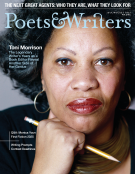Undertaken every year by scores of diligent readers, the Sealey Challenge invites participants to read one book of poetry every day for the month of August and to share their reading lists via social media. The #SealeyChallenge hashtag first took off in 2017, when poet Nicole Sealey found herself pinched between the administrative responsibilities of running the literary nonprofit Cave Canem and myriad promotional obligations supporting the publication of her debut book of poems, Ordinary Beast (Ecco Press, 2017). Initially devised as a way to motivate herself to read more poetry and to share her progress with friends and followers, the Sealey Challenge has transformed into an online phenomenon, with the #SealeyChallenge garnering over ten thousand posts.
The power of this collective literary endeavor derives not only from the rewards and difficulties of sustained immersion into poetry, but also from the connections built among an online community centered around this ambitious enterprise. As poet Laura Buccieri wrote for Literary Hub in 2019, two years into the #SealeyChallenge: “In an age of binge-watching and scrolling, the choice to spend one’s time engaging with a book per day has become increasingly rare—making such a movement more unique than ever.” This observation has grown only more resonant in an age inundated by AI-generated “content” and TikTok video clips. The power of poetry to pierce the zombified miasma of mainstream media during a time of seemingly unprecedented upheaval remains as potent as ever.
Indeed, reading publics often turn to poetry to commemorate momentous occasions, whether in times of celebration, when we search for odes and epithalamiuns, periods of mourning when elegies can soothe and console, times of abundance and gratitude (African praise poems like the Oríkì of the Yoruba, the Izibongo of the Zulu, and the Maboko of the Tswana fit the bill), and in seasons marked by precarity and uncertainty. As poet and journalist Alissa Quart wrote recently in Time, “[P]oetry can meet us where we’re at—by providing a language of political feeling and opposition.” If she didn’t exactly anticipate the widespread popularity of her hashtag, Sealey has certainly inspired a wider world of change through collective action focused on poetry. Sealey says poetry today, with its salutary quality, is unique because it “invites us to pause, to find some semblance of beauty amid the ugliness of the moment.”
This year’s Sealey Challenge will surely arrive amid ample ugliness. But as it transmutes image and song into truth, poetry offers intense and intimate responses to the uncertainties of the present. Against the brutality perpetrated against Gazans, books by Palestinian poets such as Mosab Abu Toha’s Forest of Noise (Knopf, 2024) offer nuanced depictions of the suffering of their people, even as language reaches its breaking point in its dizzying proximity to violence. As the U.S. federal government continues to dismantle agencies designed to serve Native peoples, books by Indigenous poets such as Layli Long Soldier’s WHEREAS (Graywolf Press, 2017) recall that efforts of the ruling class to erase records of indigeneity are hardly new. Despite this chilling reality, poetic works often serve as a testament to a community’s determination to survive and flourish. Likewise, books by trans poets such as Oliver Baez Bendorf’s Consider the Rooster (Nightboat Books, 2024), which locates surprising levity in bonds among human, animal, and mineral realms, can signal spirited resistance to silencing.
On her own reading list for this year, Sealey highlights titles such as Blood-Flex (New Delta Review, 2025) by Ajanaé Dawkins and Good Dress (Tin House, 2024) by Brittany Rogers. “I’ll read these two back-to-back, as I imagine them in conversation,” she says. Also on her list is The Museum of Unnatural Histories (Wesleyan University Press, 2025) by Dena’ina poet Annie Wenstrup and Heaven Looks Like Us: Palestinian Poetry (Haymarket Books, 2025) edited by Palestinian American poets George Abraham and Noor Hindi.
Reading thirty books in thirty days during the Sealey Challenge may risk readerly burnout, especially when people choose books that explore grave topics. But poetry can also act as an antidote to the jump scares of eye-catching headlines and to the endless doom of backlit screens.
Of course it’s absurd to suggest that poetry alone can assuage the wounds of warfare, the exploits of authoritarian regimes, or the disasters of systemic injustice. But then no one’s suggesting going it alone. For the Sealey Challenge this year, perhaps poetry can be paired with activism and action. As people share reading lists, they might also distribute lists of charities, demonstrations, and guidance for keeping communities safe. In these ways the aperture of Sealey’s original vision—a personal reading goal—can expand to encompass the great power and possibility of communal literary #Resistance.
Diego Báez is a writer and educator. His debut book of poems, Yaguareté White (University of Arizona Press), was named Best New Poetry Collection of 2024 by the Chicago Reader.








